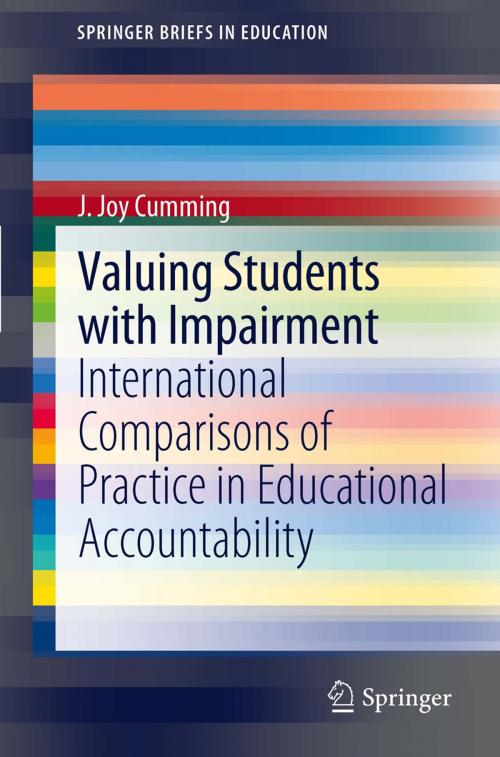Valuing Students with Impairment
International comparisons of practice in educational accountability
Nonfiction, Reference & Language, Education & Teaching, Educational Theory, Evaluation, Educational Reform| Author: | J. Joy Cumming | ISBN: | 9789400729353 |
| Publisher: | Springer Netherlands | Publication: | January 5, 2012 |
| Imprint: | Springer | Language: | English |
| Author: | J. Joy Cumming |
| ISBN: | 9789400729353 |
| Publisher: | Springer Netherlands |
| Publication: | January 5, 2012 |
| Imprint: | Springer |
| Language: | English |
In this book, the author Joy Cumming draws on knowledge of law, assessment and measurement to provide an original analysis of the inclusion of students with impairment in educational accountability assessments in the U.S., England and Australia. Equitable education of students with impairment is worldwide policy. Educational accountability for improvement of educational outcomes is also a worldwide phenomenon. The U.S., England and Australia are well placed economically and politically to pursue best educational practice for students with impairment and well advanced in both provision and educational accountability systems. Examining these three systems enables an analysis of possible optimal practices to guide other countries. The book identifies three models of impairment in place in legislation, policy and enacted practice for educational accountability with students with impairment. Intentions of legislation and policy reflect a social model of impairment—while an individual has an impairment, social practice creates the barrier that leads to a disability. In implementation, legislation and policy rely on a medical model of disability—categorizing disability in medical or specialist terms. In educational accountability practices, it is argued in this book, a third model of disability is created—a psychometric model, with impairment constructed through overemphasis on standardization of assessment processes. Eight explicit and implicit assumptions that underpin the ways students with impairment are valued in educational accountability are identified and discussed. Three recommendations are made to promote equitable inclusive educational accountability practices for students with impairment, to inform future policy and practice in all countries.
In this book, the author Joy Cumming draws on knowledge of law, assessment and measurement to provide an original analysis of the inclusion of students with impairment in educational accountability assessments in the U.S., England and Australia. Equitable education of students with impairment is worldwide policy. Educational accountability for improvement of educational outcomes is also a worldwide phenomenon. The U.S., England and Australia are well placed economically and politically to pursue best educational practice for students with impairment and well advanced in both provision and educational accountability systems. Examining these three systems enables an analysis of possible optimal practices to guide other countries. The book identifies three models of impairment in place in legislation, policy and enacted practice for educational accountability with students with impairment. Intentions of legislation and policy reflect a social model of impairment—while an individual has an impairment, social practice creates the barrier that leads to a disability. In implementation, legislation and policy rely on a medical model of disability—categorizing disability in medical or specialist terms. In educational accountability practices, it is argued in this book, a third model of disability is created—a psychometric model, with impairment constructed through overemphasis on standardization of assessment processes. Eight explicit and implicit assumptions that underpin the ways students with impairment are valued in educational accountability are identified and discussed. Three recommendations are made to promote equitable inclusive educational accountability practices for students with impairment, to inform future policy and practice in all countries.















